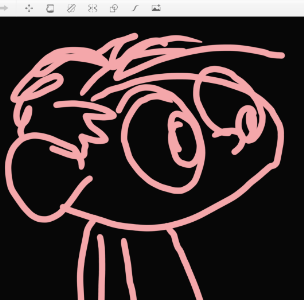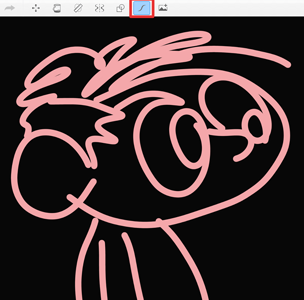Jump to Mobile
Sketchbook has two stroke tools to help create smooth and uniform strokes: Steady Stroke and Predictive Stroke.
Steady Stroke
Use  Steady Stroke to draw smoother strokes.
Steady Stroke to draw smoother strokes.
Think of Steady Stroke like painting with a brush that has long bristles. The longer the bristles are, the steadier the stroke is in the direction you are 'pulling', producing a smoother stroke overall.
Steady Stroke has a level setting that determines the offset. The larger the setting, the longer the offset will be between your cursor and the stroke.
- To draw large smooth curves, increase the offset.
- To draw small curves with tight turn radii, decrease the offset.
Increasing the offset affects your stylus response time. When drawing short curves, if you have difficulties lessen the smoothness setting.
To return to freestyle stroke mode, tap the Steady Stroke icon again to toggle it off.
Predictive Stroke
Predictive Stroke  helps to improve your stroke quality when drawing with your finger or drawing slowly.
helps to improve your stroke quality when drawing with your finger or drawing slowly.
If you don’t have a stylus, this provides a bit more control. If you’re a beginner, you might draw slowly, creating tentative strokes, so this can come in handy.


Notice in this first image, how jagged the lines are. The second was made with  Predictive Stroke. See how smooth the lines are.
Predictive Stroke. See how smooth the lines are.
Keep in mind, just because you’re drawing with your finger, doesn’t mean you have to use  . There are times when you might not want or need smooth lines.
. There are times when you might not want or need smooth lines.
Want to draw a perfect ellipse, circle, triangle, rectangle, or line? With  Predictive Stroke activated and Level set to for or 5, draw any one of these on the screen and see the tool fix them.
Predictive Stroke activated and Level set to for or 5, draw any one of these on the screen and see the tool fix them.
Setting the level of smoothness
Use the smoothness Level slider to set just how much you want your stroke to be smoothed. The higher the number, the smoother the stroke. A higher level also makes it easier for Sketchbook to recognize a circle, ellipse, or straight line when drawing freehand. If you want to draw a straight line, sharp corners, a circle or ellipse freehand, set Level to 4 or 5. The higher the number the better the shape recognition.
Snapping
Predictive stroke tries to understand your objective when drawing shapes such as lines, triangles, rectangles, and ellipses. However sometimes this can get in your way - an example is if you are trying to draw a straight line with a slight angle, Predictive Stroke will flatten that line.
To avoid this problem, you can turn off snapping  in the Predictive Stroke sub-toolbar.
in the Predictive Stroke sub-toolbar.
Note: turning off snapping will not affect rectangular shapes, their angles will still snap to 45 degrees.
Effect of zoom on Predictive Stroke
Your view in the canvas can also influence the amount your stroke is changed. More detail is removed from your stroke, making it smoother when you’re zoomed out. When zoomed tightly into your image, less detail is lost.
How to exit Predictive Stroke
To return to freestyle stroke mode, tap  to exit Predictive Stroke.
to exit Predictive Stroke.
Using Steady and Predictive Stroke in Sketchbook Pro for desktop
Using Steady Stroke
- In the toolbar, tap
 to create a smoother stroke as you draw. Another toolbar appears with a slider.
to create a smoother stroke as you draw. Another toolbar appears with a slider. - Tap-drag the slider or enter a numeric value to set the offset between your cursor and the stroke.
- Tap
 to exit the tool.
to exit the tool.
Using Predictive Stroke
- In the toolbar, select
 .
. - Determine how much smoothing you want and set a value using the Level slider. High number for a lot or small for a little. Remember that how much you’re zoomed in will have an affect.
- Draw.
- Tap
 to exit the tool.
to exit the tool.
Using Steady Stroke and Predictive Stroke in Sketchbook for mobile devices
Using Steady Stroke
- In the toolbar, select
 Steady Stroke.
Steady Stroke. - Tap-drag the slider to set the offset between your cursor and the stroke

- Draw.
- you can tap
 to minimize the sub-toolbar and continue drawing with Steady Stroke
to minimize the sub-toolbar and continue drawing with Steady Stroke
- you can tap
- When finished, tap X to exit and turn off Steady Stroke
Using Predictive Stroke
- In the toolbar, select
 Predictive Stroke.
Predictive Stroke. - Determine how much smoothing you want and set a value using the Level slider. High number for a lot or small for a little. Remember that how much you’re zoomed in will have an effect.

- Draw.
- you can tap
 to minimize the sub-toolbar and continue drawing with Predictive Stroke
to minimize the sub-toolbar and continue drawing with Predictive Stroke
- you can tap
- When finished, tap X to exit and turn off Predictive Stroke